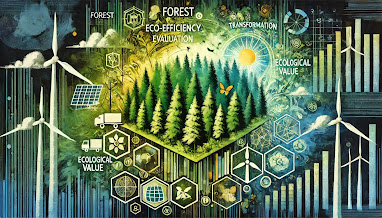Forest Eco-Efficiency: Transforming Ecological Value
The evaluation of forest eco-efficiency focuses on transforming ecological value into quantifiable measures, integrating environmental benefits with economic outputs. This approach emphasizes sustainable resource management, balancing ecological preservation with productivity. By quantifying ecological value, decision-making improves, fostering strategies that enhance forest ecosystems' resilience while addressing climate change and socio-economic needs.
Key Components of Forest Eco-Efficiency:
Ecological Value Quantification:
- Forest ecosystems provide vital services such as carbon sequestration, water purification, biodiversity conservation, and soil stabilization.
- Quantifying these services in measurable units enables a clearer understanding of their contribution to both environmental health and economic activities.
Integration of Ecological and Economic Goals:
- Balances the need for forest resource utilization (e.g., timber production, non-timber forest products) with the preservation of ecosystem services.
- Promotes sustainable practices that minimize environmental impact while maintaining economic viability.
Framework for Decision-Making:
- Provides metrics for evaluating the trade-offs between forest exploitation and conservation.
- Aids policymakers and forest managers in designing strategies to enhance forest resilience and long-term sustainability.
Benefits of Transforming Ecological Value into Quantifiable Metrics:
- Enhanced Sustainability:
- Enables the identification of practices that maximize ecological and economic outcomes.
- Improved Policy Development:
- Supports evidence-based policymaking, ensuring that environmental and socio-economic objectives are aligned.
- Increased Awareness and Accountability:
- Promotes greater understanding of forests’ contributions to global challenges like climate change mitigation and biodiversity loss.
- Facilitation of Global and Local Goals:
- Aligns forest management practices with international frameworks such as the Sustainable Development Goals (SDGs).
Conclusion:
By transforming the ecological value of forests into measurable terms, the evaluation of forest eco-efficiency fosters a deeper understanding of the interconnectedness between environmental and economic systems. This approach helps ensure the sustainable management of forest ecosystems, addressing global challenges such as climate change, biodiversity loss, and socio-economic development. It provides a critical tool for balancing the complex demands placed on forests in a way that benefits both present and future generations.
International Research Awards on Network Science and Graph Analytics
Visit Our Website : https://networkscience.researchw.com/
Contact us : network@researchw.com
Get Connected Here:
*****************
Tumblr: https://www.tumblr.com/emileyvaruni
Pinterest: https://in.pinterest.com/emileyvaruni/
Blogger: https://emileyvaruni.blogspot.com/
Twitter: https://x.com/emileyvaruni
YouTube: https://www.youtube.com/@emileyvaruni
- Get link
- X
- Other Apps
- Get link
- X
- Other Apps


Comments
Post a Comment